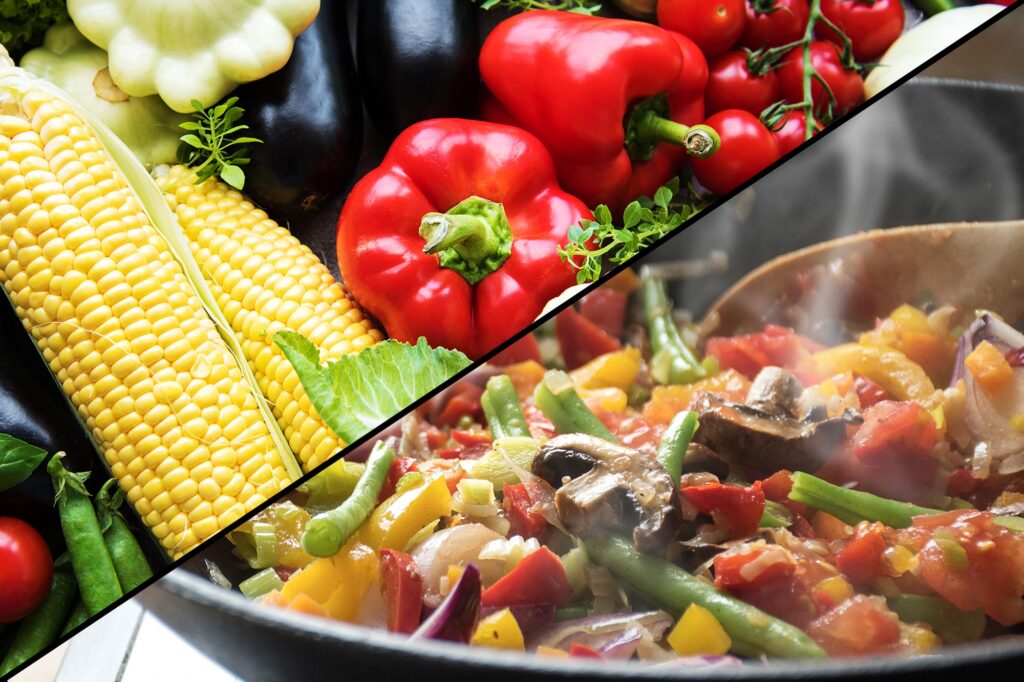There is debate as to whether cooked or raw food is better for you, and the truth is, as always, there is truth in both extremes. Most contemporary raw-food diets include 30% cooked food, and processed foods are to be avoided. Raw food diets include fermented foods, sprouted grains, nuts, and seeds, in addition to raw fruits and vegetables. In all things, balance is the key.
Extremists believe that cooked food is toxic and potentially dangerous in terms of human consumption, though this may be true when it comes to commercially processed and distributed food.
As far as nutritional value in general, the nutritional value of fruits and vegetables begins to deteriorate significantly when heated for extended periods of time. Doing so will decrease beneficial plant molecules, phytonutrients, and vitamins. The longer you cook at a high temperature the greater the loss. If you are expecting to get enzymes from the food that you eat, it is important to note that enzymes are destroyed at 117°F.
Raw fruits and vegetables begin to lose their nutritional value when they are heated to a temperature of 115°F or more. This is especially true for apples, oranges, carrots, bananas, and the like.
If you are going to heat food, do so uncut, then cut after the heating, as heating cut food releases the nutrients more rapidly. The nutrients are most susceptible to being lost from cutting include water-soluble vitamins, such as vitamin C, followed by vitamins A and E, while fat-soluble vitamins D, E, and K are mostly unaffected by cutting and cooking.
Natural loss of nutritional value is due to exposure to heat, oxygen, and light over time. Most foods naturally begin to lose their nutritional value when it is harvested. So, getting access to food soon after harvesting will yield the most nutrients.
Not all Cooking is Bad
Gentle slow cooking is a heating method that helps to retain nutrients in fruits and vegetables.
Prolonged cooking over a period of time is actually good for some food items for enhancing the antioxidant power of beta-carotene and lycopene.
Beta-carotene
Beta-carotene is a powerful antioxidant that the body converts into vitamin A. So, cook carrots, spinach, lettuce, tomatoes, sweet potatoes, broccoli, cantaloupe, and winter squash to your heart’s content, as these cooked beta-carotene-rich foods will help deliver the antioxidant power that has been proven to reduce your risk of heart disease.
Lycopene
Cook all the red fruits and vegetables such as tomatoes, pink guavas, apricots, watermelons, and pink grapefruits you want as the cooking process makes the antioxidant lycopene more bioavailable. Lycopene is effective in reducing the risk of prostate cancer in men, and heart disease.
Both, beta-carotene and lycopene, protect us from free radicals which left unattended to can proliferate and often lead to chronic disease.
Cooking may reduce the overall nutritional value of these otherwise natural sources of vitamins and minerals, but it more than doubles the antioxidant value.
Microwaves
Whatever you believe about microwaves, whether they are good or bad if you have such an opinion, they do preserve the nutrients of raw fruits in vegetables. You risk the same depletion of nutrients as heating to temperatures over 115°F, but microwave heating exposes your raw food to these high temperatures for much less time, thereby saving nutrients that would have been lost at longer heat exposure.
Note that microwaves can be dangerous as they may expose users to microwave radiation. Microwaves cook organic material, and that includes you, too. Areas of the body particularly sensitive to microwave radiation are the eyes and testes.
Cooking Can Make Food Safe to Eat
If you do not have access to food that is safe to eat, or if your food sources are questionable, cooking any food to over 140°F will kill most bacteria, making food safer to ingest with a lower chance of contracting a food-borne illness.
Some foods may not be safe to eat in their raw forms, such as meat, eggs, or dairy, though some people do. If you choose to do so, please know where your food comes from, and be certain that you can trust the source.
Submitted by David M Masters
